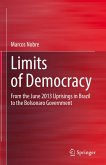Inspired by books of short stories, the chapters discuss different aspects of the distinction between militancy and prefigurative activism. On them, the author deals with problems such as: how are the ongoing changes in Brazilian protest culture connected with the rising popularity of autonomist movements across the globe? What differences does it make rooting protest strategies in principles like resistance or refusal? How does the culture informing militants and prefigurative activists' conduct affect their political goals and horizons? How does militant and prefigurative activist culture relate to militants and prefigurative activists' forms of political consciousness?
A Political Psychology Approach to Militancy and Prefigurative Activism: The Case of Brazil will be a valuable tool for social movement researchers from different disciplines interested in understanding how can subjectivity be, at the same time, a determiner of activities performed in collective action, and determined by these same transformative deeds.
Dieser Download kann aus rechtlichen Gründen nur mit Rechnungsadresse in A, B, BG, CY, CZ, D, DK, EW, E, FIN, F, GR, HR, H, IRL, I, LT, L, LR, M, NL, PL, P, R, S, SLO, SK ausgeliefert werden.









